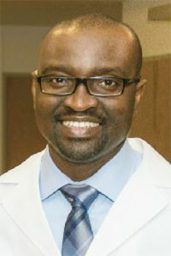Cathy Larson is nearly half the woman she used to be.
Three years ago, she was severely overweight, suffering from terrible acid reflux and high blood pressure. She also was diagnosed with multiple sclerosis, which, combined with excessive weight, caused debilitating joint pain.
Cathy, 57, had tried nearly every diet with varying results. When a co-worker underwent bariatric surgery, she decided to look into a more permanent solution for losing weight. Her primary care physician referred her to bariatric surgeon Seun Sowemimo, MD.
“I’m very active riding and caring for horses on our small farm, but carrying more than 100 extra pounds made it difficult,” says Cathy, a New Egypt resident who works as a 9-1-1 dispatcher. “Then I met with Dr. Seun and everything changed.”
 Dr. Sowemimo discussed her surgical options and the risks, and Cathy attended a bariatric surgery information session at CentraState to learn more. She chose to have gastric sleeve surgery, a minimally invasive procedure that removes three-quarters of the stomach, leaving just a small, narrow pouch. The surgery helps patients lose weight by restricting the amount of food they can eat and reducing the production of ghrelin, a hormone associated with hunger.
Dr. Sowemimo discussed her surgical options and the risks, and Cathy attended a bariatric surgery information session at CentraState to learn more. She chose to have gastric sleeve surgery, a minimally invasive procedure that removes three-quarters of the stomach, leaving just a small, narrow pouch. The surgery helps patients lose weight by restricting the amount of food they can eat and reducing the production of ghrelin, a hormone associated with hunger.
Life After Bariatric Surgery
Cathy says she felt “normal” within two weeks and was back at work in three: “This surgery was nothing compared to my two C-sections,” jokes the mother of two teenage boys.
It didn’t take long for her body to respond positively. She lost 70 pounds in three months, and four months later she was off blood pressure medication. In total, Cathy lost 116 pounds in 10 months, gaining energy and a new passion for clothes shopping.
As a competitive distance rider, Cathy says riding her two horses is easier, and she’s now able to mount them without using a block. She’s also started walking, covering a minimum of four miles in an hour. The best change in her life, though, was being able to climb the bleachers at her sons’ football games and wrestling matches.
Cathy sometimes has to remind herself to eat now, and when she does, she takes time to chew slowly and eats only small amounts. While she’s allowed to eat small portions of just about any type of food, she’s opted to cut out bread, potatoes, rice, pizza, and pasta. The biggest adjustment was preventing dehydration. Since Cathy’s stomach is much smaller, her body requires smaller amounts of fluids more frequently, so she always carries a refillable water bottle.
For ongoing support, Cathy often attends Dr. Sowemimo’s monthly patient meetings. Participants share ways surgery has changed their bodies and how they’re handling those changes.
“People think that bariatric surgery is the ‘easy’ fix, but this is major, organ-altering surgery,” Cathy says. “My body is surgically changed, but truly for the better. I only wish I had done it in my 40s.”
For more information about bariatric surgery services and information sessions at CentraState, call 866-CENTRA7 (866-236-8727).





